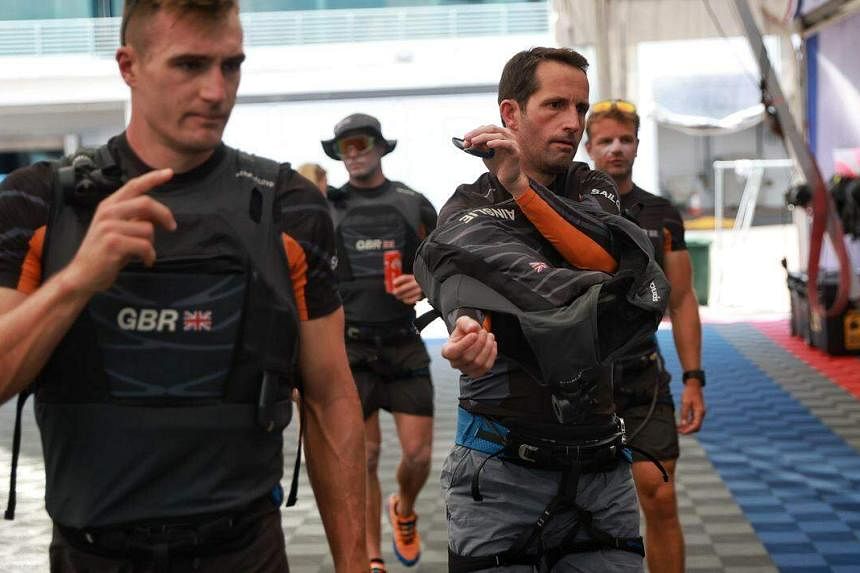In a home in south-west London lies a sailor’s treasure whose worth cannot quite be estimated. How do you put a price on a life of sweat, skill and ambition? The treasure is silver and gold and is kept in a “little washbag, you know like you get on an airliner”.
On Saturday, the owner of this treasure was jousting on the water in Singapore. As a camera-wielding helicopter swooped low and boats skidded across the East Coast in the SailGP series, Ben Ainslie didn’t have time to think of his four Olympic golds and one silver. The past in sport is meaningful, but the next win is the only treasure which matters.
Ask him who he admires in sport beyond sailing and he picks Roger Federer and Tiger Woods, athletes who “are able to operate at a different level when they need to”. Pressure stimulates great athletes, it doesn’t scare them.
“I think if you’re a top sportsperson,” says Ainslie, “you want to be in those positions where you’re under the utmost pressure because, to my mind, that’s what competition is about.
“And ultimately, if you’re going to win some major prizes, you’re gonna have to deal with it. So you got to learn to like it and to embrace it and to use it as a tool... I love being in those high-pressure, high-stakes scenarios, that gives me a real buzz. It’s something that you feed off.”
On Friday, practice finished, debriefing over, I met Ainslie at the Changi Exhibition Centre. He has the hard handshake of a man who’s spent a lifetime in salty labour at sea and has cast off some of his boyhood shyness. Bullied at school, he found acceptance from this tribe on water.
Interviewing great athletes is fascinating for we’re always trying to prise open their brains and study the elements of their exceptionalism. What makes them is a long list, but he has a few suggestions? “Determination,” he suggests. “A fear of losing, I think, is always a big one for any athlete.”
Explain, I ask, and he does. “It’s the sort of pain of not achieving what you want to achieve. You put a lot of hard work and effort into something and you really want to achieve that. I guess all sportspeople have a bit of an ego. So you don’t like losing to anybody.”
High-achieving athletes have an inner lining of ruthlessness and Ainslie – a multiple world champion and America’s Cup winner – is not a man to rile. When two rivals seemingly ganged up against him at London 2012, he responded: “They’ve made me angry and you don’t want to make me angry.” A fourth gold dutifully followed.
Great athletes often seize on a slight from a rival and turn it into a cause. And if you ask Ainslie if he sails better when provoked, he offers a nuanced reply. “I think at certain stages in my career, I’ve needed someone to fight against, like you say, a spark to ignite, to say, ‘I’m going to fight back against that and I’m going to work harder, and I’m not going to be beaten’.
“A couple of times in my career, I’ve had to use that and had to use a competitor or something else as a challenge. Most of the time it’s worked, not always. I think different people feed off differently to setbacks, to being antagonised.”

Out in the water on Saturday, no one wants to lose as nine teams battle in their magisterial F50 wingsailed catamarans. From side on, with their colourful 29-metre masts, they can resemble single-winged butterflies attempting to fly. If golfers believe their arena is testing because it alters shape every week – the fairways tighter, the rough thicker – they should come to the sea. This arena moves, it shakes, it holds deep secrets, it’s moody. Wind is an inconvenience in other sports, like the draught in badminton, but here it’s the kiss of life. Ask sailors about it and they almost turn mystical.
“One of the things that you have to have,” explains Ainslie, “if you’re going to be a successful racing sailor is almost a sixth sense for the wind. And reading the wind on the water, the clouds and understanding where the wind is going to be next. So it’s a little bit like chess on water.”
Everything on the water usually happens at speed, though Saturday is a day of dismally light air. In Saint-Tropez, France, last year, a boat flew at 99.94kmh but, on this day, the top speed is a mere 45.9kmh. Still brains processed information at high velocity as sailors relied on reams of data but also an ancient human quality. Instinct.
“In sailing there are,” says Ainslie, “any number of set moves, which you may or may not decide. But it is, and will always be, instinctive because the wind is always changing. And it’s impossible to predict that totally accurately. And so you have to use your instinct a lot of the time.
“And like any other sport, it’s a confidence game because, if you’re confident, you might actually not make absolutely the perfect decision. But if you still execute that really well, it’s far better than making the right decision but not executing it well.”
Sailing can feel like an alien world where the boats usually float in the distance like tiny white triangles and the lingo is foreign. Yet even though Saturday was undramatic, this series brings the action very close to the shore and introduces us to sect of sportspeople who are intriguing.
Ainslie is one of them and just listening to him speak about his world is a pleasure. “I just love the nature of the sport, being out on the water, listening to the water rippling under the hull of the boat, the sense of freedom that you get.”
In the competitive treasure hunter from Macclesfield in Cheshire, there’s evidently a trace of a poet.

